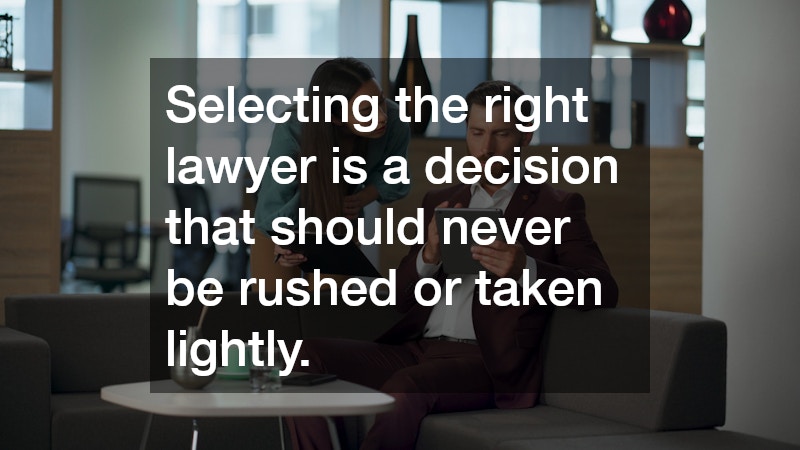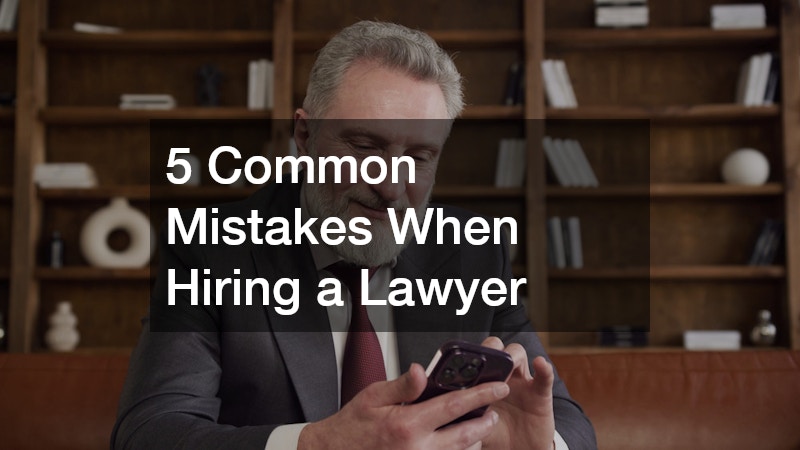Hiring a lawyer is a significant decision that can greatly impact the outcome of your legal matters. Whether you are facing a family dispute, criminal charge, property transaction or business issue, having the right legal representation can make a critical difference.
However, many individuals and businesses make avoidable mistakes during the hiring process. These missteps can lead to dissatisfaction, unnecessary expenses or unfavourable legal outcomes. Understanding the most common errors can help you make a more informed decision and ensure that your interests are properly protected.
Failing to Research the Lawyer’s Experience & Expertise
One of the most common mistakes people make is hiring a lawyer without properly assessing their background and area of expertise. Law is a broad field, and not every legal practitioner will have the skills or knowledge relevant to your specific needs. For instance, a solicitor who typically handles conveyancing may not be equipped to deal with complex criminal defence cases. Similarly, someone who works mainly in corporate law may lack experience in family law or personal injury matters.
Before committing, it is essential to investigate the lawyer’s qualifications, previous cases, and areas of practice. Look for signs of relevant experience and ask direct questions about how many similar cases they have handled. Don’t hesitate to request references or examples of outcomes they have achieved in situations like yours. Proper research can help you avoid ending up with someone who is not the right fit for your circumstances.
Choosing Based on Price Alone
While legal fees are a valid consideration, selecting a lawyer solely because they are the cheapest or most expensive can backfire. A low hourly rate may seem appealing, but it may also reflect a lack of experience or a high case volume that results in less personalised attention. On the other hand, a high fee does not necessarily guarantee superior service or results.
Rather than focusing entirely on cost, consider the overall value you are receiving. This includes the lawyer’s availability, communication skills, case strategy, and willingness to understand your unique situation. Transparency around billing is also crucial. Make sure you understand how you will be charged—whether it is a flat fee, hourly rate or contingency arrangement—and clarify any potential additional expenses. A balanced approach that weighs cost against competence and service is more likely to yield a positive experience.
Overlooking Communication & Compatibility
Legal matters can be complex and stressful, making clear communication between you and your lawyer critically important. A common oversight is hiring someone who is either unresponsive or difficult to understand. If you find it hard to get a call back, receive vague answers to your questions, or feel rushed through meetings, it may be a red flag.
Compatibility also plays a role in the client-lawyer relationship. You should feel comfortable sharing sensitive details and confident that your concerns are being taken seriously. During initial consultations, pay attention to how the lawyer interacts with you. Do they listen attentively? Do they explain legal jargon in plain English? Do they respect your input? These are all indicators of how well your communication will function throughout the course of the legal matter. Failing to evaluate this aspect can lead to frustration and misunderstandings later on.
Neglecting to Check References and Reviews
Many people skip the step of checking reviews or speaking to past clients, assuming that a professional appearance or polished website is sufficient proof of credibility. However, online reviews and personal testimonials can offer insight into how a lawyer actually operates on a day-to-day basis. Look for patterns in feedback—consistent praise or recurring complaints can give you a clearer picture of what to expect.
If possible, reach out to people who have used the lawyer’s services for similar matters. Ask about their experience, how the case was handled, and whether they felt supported throughout the process. Trustworthy lawyers will usually be happy to provide references or case studies. Taking the time to verify the reputation of your legal representative can prevent disappointment and ensure a more reliable outcome.
Failing to Clarify Scope & Expectations
Another significant mistake is not clearly defining the scope of the lawyer’s role or setting realistic expectations from the start. Legal processes can be lengthy, unpredictable, and affected by external factors such as court schedules or opposing parties. If expectations are not properly managed, clients may feel misled or dissatisfied, even if the lawyer performs adequately.
Make sure you understand what the lawyer can and cannot do, the likely duration of the matter, and the potential range of outcomes. A professional lawyer will be honest about risks, provide a tentative timeline, and outline the responsibilities on both sides. Getting everything in writing—preferably in a formal engagement letter—will help eliminate ambiguity and keep both parties accountable. Misunderstandings are far less likely to arise when expectations are clear from the outset.
Selecting the right lawyer is a decision that should never be rushed or taken lightly. The right lawyer is more than just a legal expert—they are a trusted adviser, a source of clarity in complex situations, and a crucial partner in protecting your rights and interests. Taking the time to make a careful and informed choice will pay dividends in both peace of mind and long-term results.

